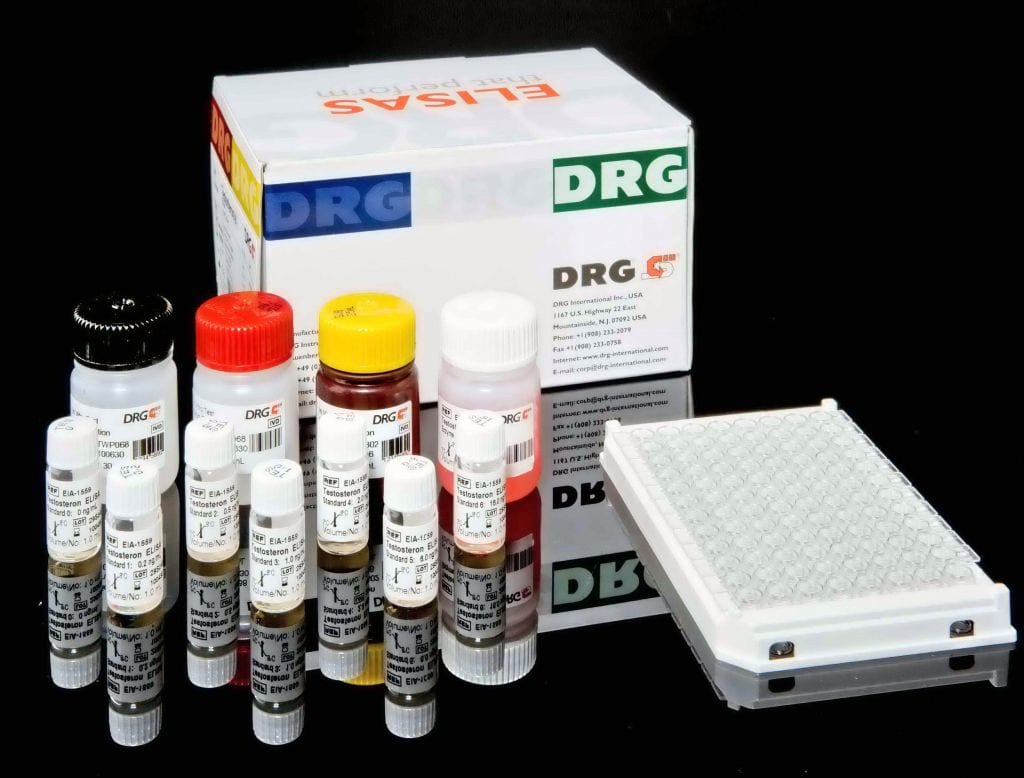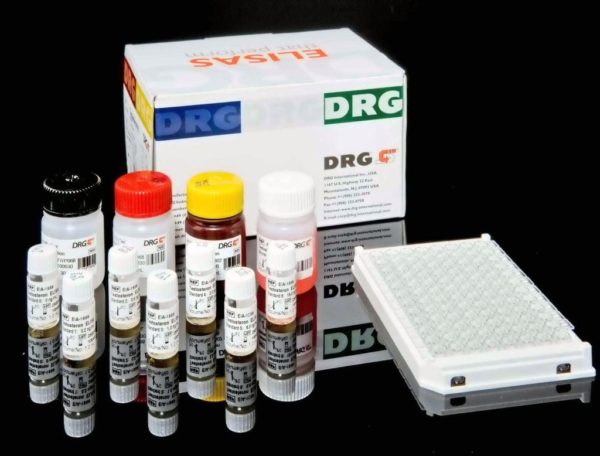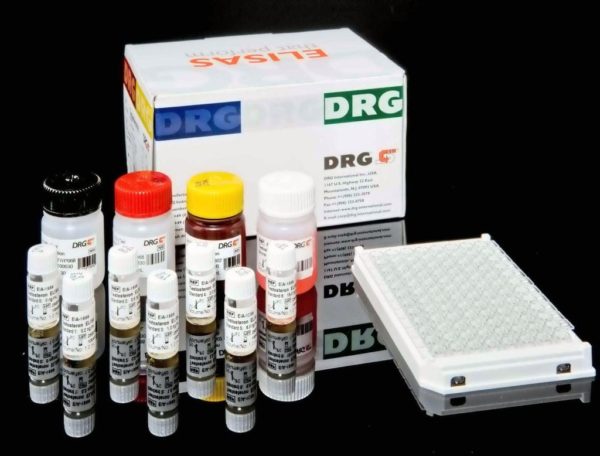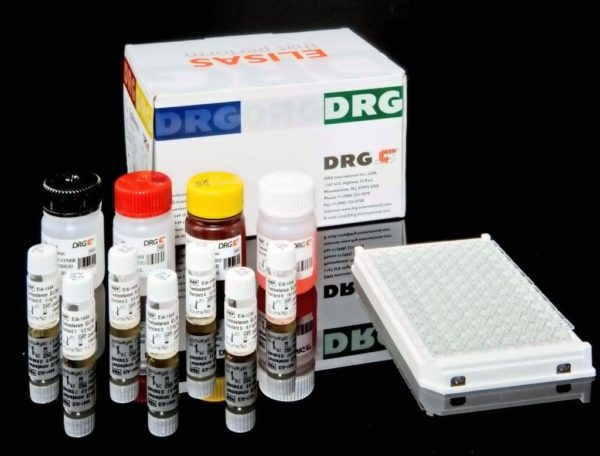Description
Anti-beta-2-Glycoprotein I Screen is an ELISA test system for the quantitative measurement of IgG, IgM and IgA class autoantibodies against beta-2-Glycoprotein I in human serum or plasma.
This product is intended for professional in vitro diagnostic use only.Highly purified beta-2-glycoprotein I is bound to microwells. The determination is based on an indirect enzyme linked immune reaction with the following steps:
Specific antibodies in the patient sample bind to the antigen coated on the surface of the reaction wells. After incubation, a washing step removes unbound and unspecifically bound serum or plasma components. Subsequently added enzyme conjugate binds to the immobilized antibody-antigen-complexes. After incubation, a second washing step removes unbound enzyme conjugate. After addition of substrate solution the bound enzyme conjugate hydrolyses the substrate forming a blue coloured product. Addition of an acid stops the reaction generating a yellow end-product.The intensity of the yellow color correlates with the concentration of the antibody-antigen-complex and can be measured photometrically at 450 nm.
Anti phospholipid syndrome (APS, Hughes Syndrome) is a systemic autoimmune disease that causes thromboses, recurrent miscarriage, and intrauterine foetal death. Clinical symptoms are accompanied by the occurrence of specific autoantibodies that are detectable in the blood of patients with APS. These antibodies bind to phospholipids like cardiolipin, or phospholipid-binding proteins like beta-2-glycoprotein I. The clinical symptoms of APS alone are not sufficiently specific to make a definitive diagnosis. Laboratory tests thus play an important role in the diagnosis of the disease. The Scientific and Standardization Committee of the International Society on Thrombosis and Hemostasis defined clinical criteria and diagnostically relevant laboratory parameters in the Sapporo Criteria for the classification of anti phospholipid syndrome, published in 1999. These were revised and updated in 2006 and 2012.
They include the following laboratory parameters:
1. Detection of lupus anticoagulant (LA) in the plasma twice in the space of twelve weeks, according to the guidelines of the International Society on Thrombosis and Hemostasis.
2. Elevated anti-cardiolipin titre (IgG and/or IgM) in the blood. The values must be determined on two occasions at least twelve weeks apart using standardized ELISA tests for beta-2-glycoprotein I dependent cardiolipin antibodies.
3. Elevated beta-2-glycoprotein I antibody titre (IgG and/or IgM). The values must be determined on two occasions at least twelve weeks apart. Detection is performed by means of a standardized ELISA test.
The diagnosis of APS is considered as confirmed when at least one clinical and one of the laboratory criteria are fulfilled. In primary APS autoantibodies against
phospholipids appear independently, while in secondary APS phospholipid antibodies are detected in conjunction with other autoimmune diseases, such as lupus erythematosus, rheumatoid arthritis, or SjgrenÕs syndrome. Phospholipid antibodies are detectable in only 1-5 % of healthy individuals, but they are
found in 16-35 % of lupus patients. The presence of anti-cardiolipin antibodies in systemic lupus erythematosus (SLE) can be related to the development of
thrombosis and thrombocytopenia. In gynaecology they are supposed to cause intrauterine death or recurrent abortion. Furthermore, anti-cardiolipin
antibodies have been detected in neurological disorders like cerebrovascular insufficiency, cerebral ischemia, epilepsy or chorea. Anti-cardiolipin autoantibodies occur in the immunoglobulin classes IgG, IgM or IgA. The determination of IgM antibodies is a valuable indicator in the diagnosis of beginning autoimmune diseases, whereas IgG antibodies are present in progressive stages of manifested autoimmune disorders. The determination of IgA antibodies seems to have a greater importance in the African-Caribbean population. Quantitative measurement of anti-cardiolipin antibodies, especially IgG, shows high specificity in therapy-monitoring of secondary APS related to SLE. Clinical indications for determination of anti-cardiolipin antibodies are: SLE, thrombosis, thrombocytopenia, cerebral ischemia, chorea, epilepsy, recurrent abortion, intrauterine death.The discovery that anti-phospholipid antibodies recognize plasma proteins that are associated with phospholipids rather than binding to the phospholipids themselves has been a major advance in APS research. Several reports indicate that beta-2-glycoprotein I antibodies are clinically relevant. Recent studies suggest the presence of a dominant epitope on the first domain of beta-2-glycoprotein I. In contrast to antibodies recognizing other domains of beta-2-glycoprotein I, anti-domain I antibodies are found to be highly associated with clinical symptoms. Anti-cardiolipin and anti-beta-2-glycoprotein I antibodies are independent risk factors for the occurrence of vascular thrombosis and pregnancy loss. However, patients testing positive for multiple antibody specificities generally have a more severe disease and higher recurrence rates despite treatment. Besides the standardized laboratory assays for detection of anti-cardiolipin antibodies, antibodies directed to beta_2-gycoprotein I and LA, defined in the classification criteria, several other autoantibodies have shown to be relevant to APS. Among them are antibodies against negatively-charged phospholipids, like phosphatidyl serine, beta-2-glycoprotein I and phosphatidic acid (PA).
These antigens can improve the clinical sensitivity in patient samples with suspected APS but they will not replace the determination of autoantibodies against cardiolipin or beta-2-glycoprotein I. Autoantibodies that bind to proteins of the coagulation cascade or complexes of these proteins with phospholipids have also been proposed to be relevant for APS. As an example, a test for anti-prothrombin antibodies in conjunction with other parameters may be a good risk marker for thrombosis. Antibodies to Annexin V may also be detectable within the clinical framework of APS with otherwise negative phospholipid antibody results.




